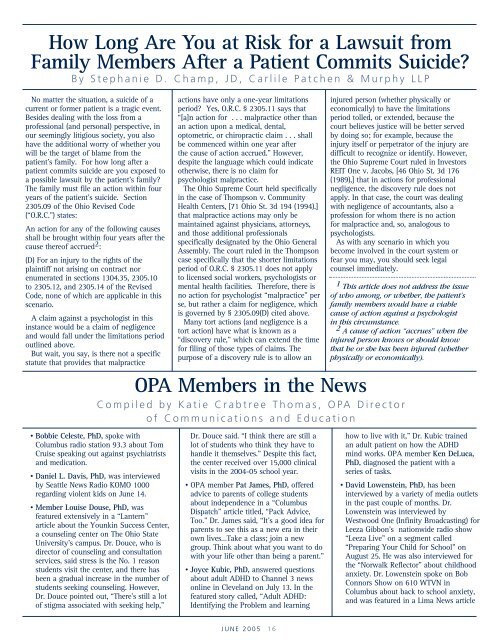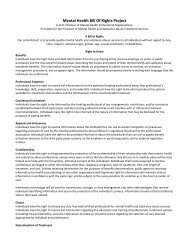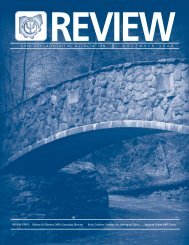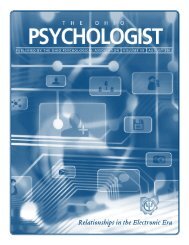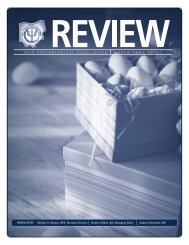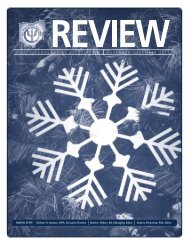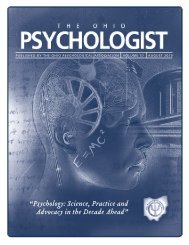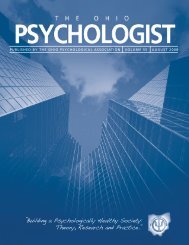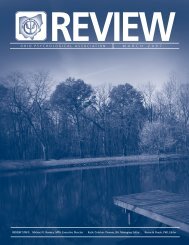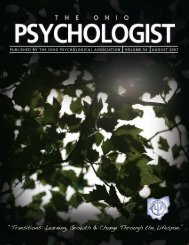The OP Review November 2005 - Ohio Psychological Association
The OP Review November 2005 - Ohio Psychological Association
The OP Review November 2005 - Ohio Psychological Association
You also want an ePaper? Increase the reach of your titles
YUMPU automatically turns print PDFs into web optimized ePapers that Google loves.
How Long Are You at Risk for a Lawsuit from<br />
Family Members After a Patient Commits Suicide<br />
By Stephanie D. Champ, JD, Carlile Patchen & Murphy LLP<br />
No matter the situation, a suicide of a<br />
current or former patient is a tragic event.<br />
Besides dealing with the loss from a<br />
professional (and personal) perspective, in<br />
our seemingly litigious society, you also<br />
have the additional worry of whether you<br />
will be the target of blame from the<br />
patient’s family. For how long after a<br />
patient commits suicide are you exposed to<br />
a possible lawsuit by the patient’s family<br />
<strong>The</strong> family must file an action within four<br />
years of the patient’s suicide. Section<br />
2305.09 of the <strong>Ohio</strong> Revised Code<br />
(“O.R.C.”) states:<br />
An action for any of the following causes<br />
shall be brought within four years after the<br />
cause thereof accrued 2 :<br />
(D) For an injury to the rights of the<br />
plaintiff not arising on contract nor<br />
enumerated in sections 1304.35, 2305.10<br />
to 2305.12, and 2305.14 of the Revised<br />
Code, none of which are applicable in this<br />
scenario.<br />
A claim against a psychologist in this<br />
instance would be a claim of negligence<br />
and would fall under the limitations period<br />
outlined above.<br />
But wait, you say, is there not a specific<br />
statute that provides that malpractice<br />
actions have only a one-year limitations<br />
period Yes, O.R.C. § 2305.11 says that<br />
“[a]n action for . . . malpractice other than<br />
an action upon a medical, dental,<br />
optometric, or chiropractic claim . . . shall<br />
be commenced within one year after<br />
the cause of action accrued.” However,<br />
despite the language which could indicate<br />
otherwise, there is no claim for<br />
psychologist malpractice.<br />
<strong>The</strong> <strong>Ohio</strong> Supreme Court held specifically<br />
in the case of Thompson v. Community<br />
Health Centers, [71 <strong>Ohio</strong> St. 3d 194 (1994).]<br />
that malpractice actions may only be<br />
maintained against physicians, attorneys,<br />
and those additional professionals<br />
specifically designated by the <strong>Ohio</strong> General<br />
Assembly. <strong>The</strong> court ruled in the Thompson<br />
case specifically that the shorter limitations<br />
period of O.R.C. § 2305.11 does not apply<br />
to licensed social workers, psychologists or<br />
mental health facilities. <strong>The</strong>refore, there is<br />
no action for psychologist “malpractice” per<br />
se, but rather a claim for negligence, which<br />
is governed by § 2305.09(D) cited above.<br />
Many tort actions (and negligence is a<br />
tort action) have what is known as a<br />
“discovery rule,” which can extend the time<br />
for filing of those types of claims. <strong>The</strong><br />
purpose of a discovery rule is to allow an<br />
injured person (whether physically or<br />
economically) to have the limitations<br />
period tolled, or extended, because the<br />
court believes justice will be better served<br />
by doing so; for example, because the<br />
injury itself or perpetrator of the injury are<br />
difficult to recognize or identify. However,<br />
the <strong>Ohio</strong> Supreme Court ruled in Investors<br />
REIT One v. Jacobs, [46 <strong>Ohio</strong> St. 3d 176<br />
(1989),] that in actions for professional<br />
negligence, the discovery rule does not<br />
apply. In that case, the court was dealing<br />
with negligence of accountants, also a<br />
profession for whom there is no action<br />
for malpractice and, so, analogous to<br />
psychologists.<br />
As with any scenario in which you<br />
become involved in the court system or<br />
fear you may, you should seek legal<br />
counsel immediately.<br />
1 This article does not address the issue<br />
of who among, or whether, the patient’s<br />
family members would have a viable<br />
cause of action against a psychologist<br />
in this circumstance.<br />
2 A cause of action “accrues” when the<br />
injured person knows or should know<br />
that he or she has been injured (whether<br />
physically or economically).<br />
<strong>OP</strong>A Members in the News<br />
Compiled by Katie Crabtree Thomas, <strong>OP</strong>A Director<br />
of Communications and Education<br />
• Bobbie Celeste, PhD, spoke with<br />
Columbus radio station 93.3 about Tom<br />
Cruise speaking out against psychiatrists<br />
and medication.<br />
• Daniel L. Davis, PhD, was interviewed<br />
by Seattle News Radio KOMO 1000<br />
regarding violent kids on June 14.<br />
• Member Louise Douse, PhD, was<br />
featured extensively in a “Lantern”<br />
article about the Younkin Success Center,<br />
a counseling center on <strong>The</strong> <strong>Ohio</strong> State<br />
University’s campus. Dr. Douce, who is<br />
director of counseling and consultation<br />
services, said stress is the No. 1 reason<br />
students visit the center, and there has<br />
been a gradual increase in the number of<br />
students seeking counseling. However,<br />
Dr. Douce pointed out, “<strong>The</strong>re’s still a lot<br />
of stigma associated with seeking help,”<br />
Dr. Douce said. “I think there are still a<br />
lot of students who think they have to<br />
handle it themselves.” Despite this fact,<br />
the center received over 15,000 clinical<br />
visits in the 2004-05 school year.<br />
• <strong>OP</strong>A member Pat James, PhD, offered<br />
advice to parents of college students<br />
about independence in a “Columbus<br />
Dispatch” article titled, “Pack Advice,<br />
Too.” Dr. James said, “It’s a good idea for<br />
parents to see this as a new era in their<br />
own lives…Take a class; join a new<br />
group. Think about what you want to do<br />
with your life other than being a parent.”<br />
• Joyce Kubic, PhD, answered questions<br />
about adult ADHD to Channel 3 news<br />
online in Cleveland on July 13. In the<br />
featured story called, “Adult ADHD:<br />
Identifying the Problem and learning<br />
how to live with it,” Dr. Kubic trained<br />
an adult patient on how the ADHD<br />
mind works. <strong>OP</strong>A member Ken DeLuca,<br />
PhD, diagnosed the patient with a<br />
series of tasks.<br />
• David Lowenstein, PhD, has been<br />
interviewed by a variety of media outlets<br />
in the past couple of months. Dr.<br />
Lowenstein was interviewed by<br />
Westwood One (Infinity Broadcasting) for<br />
Leeza Gibbon’s nationwide radio show<br />
“Leeza Live” on a segment called<br />
“Preparing Your Child for School” on<br />
August 25. He was also interviewed for<br />
the “Norwalk Reflector” about childhood<br />
anxiety. Dr. Lowenstein spoke on Bob<br />
Connors Show on 610 WTVN in<br />
Columbus about back to school anxiety,<br />
and was featured in a Lima News article<br />
JUNE <strong>2005</strong> 16


